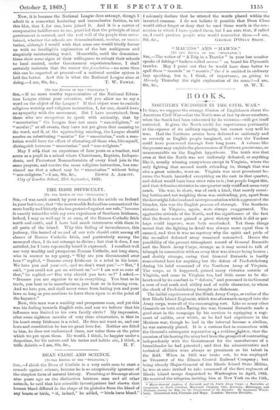THE IRISH DIFFICULTY.
[To THE EDITOR OF THE "SPECTATOR:1 SIR,—I was much struck by your remark in the article on Ireland in your last issue, that "the more wealth Irelaudhas accumulated the more loudly and bitterly she has protested against our rule," because it exactly coincides with my own experience of Southern Irishmen, indeed, I may as well say it at once, of the Roman Catholic Irish north and south, and I have had much intercourse with them in all parts of the island. Why this feeling of incumbrance, this jealousy, this hatred of us and of our rule should exist among all classes of Roman Catholic Irish, and particularly among the moneyed class, I do not attempt to divine ; but that it does, I am satisfied, for I have repeatedly heard it expressed. I recollect well one very wealthy and prosperous Roman Catholic, not long since, who in answer to my query, "Why are you discontented over here ?" replied, "Because every Irishman is a rebel in his heart. We hate you and your rule, and we don't want you."—" But," I said, "you could not get on without us."—" I am not so sure of that," he replied.—" But why should you hate us ?" I asked.— " Because you are superior to us in everything. You beat us in trade, you beat us in manufactures, you beat us in farming even. And we hate you, and shall never cease from hating you and your laws as long as you continue to force them upon us at the point of the bayonet."
Now, this man was a wealthy and prosperous man, and yet this was his feeling towards English rule, and can we believe that his influence was limited to his own family circle ? My impression, after some eighteen months of very close observation, is that in his heart every Irishman is a rebel. He does not want us, and our laws and constitution he has no great love for. Neither are fitted to him, he does not understand them, nor value them at the price which we put upon them. He would, I think, be happier under a despotism, for his nature and his tastes and habits are, I think, a






























 Previous page
Previous page